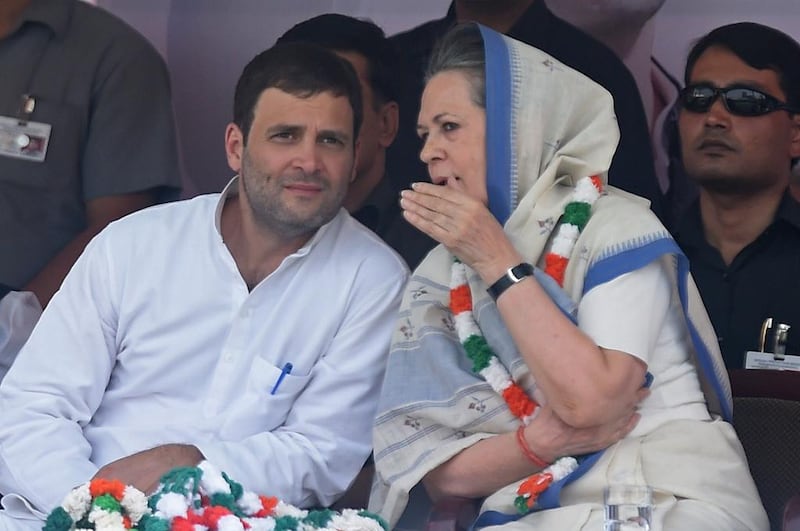Over the past two weeks, Rahul Gandhi, the vice-president of India’s flailing opposition Congress party, toured the United States, laying out his vision for his country and criticising prime minister Narendra Modi’s governance.
In San Francisco, Los Angeles, Washington, DC, Princeton and New York, Mr Gandhi hammered his messages home: that Mr Modi’s Hindu nationalist politics are staining a tolerant Indian society, that his policies are failing to create jobs and that his demonetisation drive last year, designed to unearth untaxed stashes of currency, proved futile.
I had many conversations during my trip. Most people were worried about what has happened to the tolerance that used to prevail in India pic.twitter.com/tB8RfHte8t
— Rahul Gandhi (@RahulGandhi) September 21, 2017
Mr Gandhi spoke to students at the universities of Berkeley and Princeton; to newsrooms and think tanks in Washington — though off the record; to Republican Party leaders; and to the Indian National Overseas Congress, his party’s chapter abroad.
WATCH: Congress VP Rahul Gandhi's full address to the Indian National Overseas Congress in New York. #RGinUShttps://t.co/gKflzLh0cO
— Congress (@INCIndia) September 21, 2017
This US tour was a prologue to an organisational shake-up in Congress. In October or November, Mr Gandhi, 47, will be elevated to the post of party president. He will replace his mother, Sonia Gandhi, who has occupied the presidency for 19 years.
Mr Gandhi himself has refused to confirm his elevation to reporters, saying an internal party election will first have to take place. But Congress has always been a party of the Gandhi family, so the election is widely expected to be a mere formality.
One Congress party member, asking not to be named, told The National Mr Gandhi is already preparing for his new role. Other media reports, citing anonymous sources, have also relayed his imminent promotion.
“He should immediately take over as Congress president,” M Veerappa Moily, a party leader, told journalists on September 15. “That’s good for the party and good for the country.”
Mr Gandhi will become the president of Congress at a vital juncture. Decimated three years ago by Mr Modi's Bharatiya Janata Party (BJP) in the general election, the party has seen its influence and popularity shrink.
_______________
Read more:
[ India demonetisation figures deal blow to Modi ]
[ BJP and Congress face off in bid for India presidency ]
[ Landslide victory for BJP makes India's Modi most powerful leader in decades ]
[ Could Priyanka Gandhi be Congress party's secret weapon? ]
_______________
Since 2014, it has suffered in state elections, winning only in Punjab earlier this year. Congress now rules just five Indian states while the BJP and its partners are in power in 18 out of 30.
Meanwhile, Congress holds only 45 of the 543 seats in the Lok Sabha, the lower house of parliament, compared to the BJP's 280.
State elections are coming up in November and December in Himachal Pradesh and Gujarat, Mr Modi’s home state. By the time they are concluded, the Congress will have a year and a half to prepare to challenge Mr Modi’s prime ministership in 2019.
In the US, Mr Gandhi laid down the preliminary planks of an opposition platform.
Mr Modi promised a surging economy but is struggling to create jobs, Mr Gandhi said. Thirty-thousand young Indians come into the workforce daily but there are jobs for only 450 of them, he added — a statistic he repeated at every event.
Where the prime minister had succeeded, Mr Gandhi said at Berkeley on September 12, was in pushing his politics of polarisation. He referred to the lynchings of Muslims and lower-caste Dalits over suspicions of beef consumption or cattle slaughter — anathema to the Hindu right, which deems the cow too sacred to kill.
“Hatred, anger and violence can destroy us,” he said. “The idea of non-violence is under attack today.”
_______________
Read more:
[ Indian PM finally speaks up about attacks by cow vigilantes ]
[ What a small-town printing press says about Hindu nationalism today ]
[ 'Cow protectors' pose electoral threat for Modi and his party ]
_______________
Mr Gandhi admitted that his party had lost its way. “Around 2012, arrogance crept into the Congress party, and we stopped having conversations with people,” he said. But he expressed confidence he could revive it, saying he sought the support of Indians living in America.
Sanjay Kadaveru, the founder of Action for India, a non-profit that works with social innovators, attended Mr Gandhi’s talks in both Berkeley and New York.
"I'm pretty non-partisan and it isn't like I've been a big fan in the past," he told The National. "He seemed very sincere here and he had these ideas about jobs and intolerance that really resonated."
“He spoke extempore in New York,” Mr Kadaveru added. “It was powerful. He was definitely connecting with people.”
But Mr Gandhi’s successful speeches to audiences in the US have little correlation with his ability to formulate a winning plan at home, said Milan Vaishnav, the director of the South Asia programme at Washington, DC’s Carnegie Endowment for International Peace.
Mr Gandhi is still unable to communicate a clear vision for India, Mr Vaishnav told The National. "First, the high command culture of the party means that internal democracy is limited. There is only limited scope for a free and open debate over ideas."
Mr Modi has also saturated the political space, making it difficult to counter him.
“And there has been limited investment by the party in developing new, progressive ideas for the future,” Mr Vaishnav said.
“The focus, to date, has been on what the Congress has done for India in the past. That is not the aspirational vision young Indians are looking for.”





